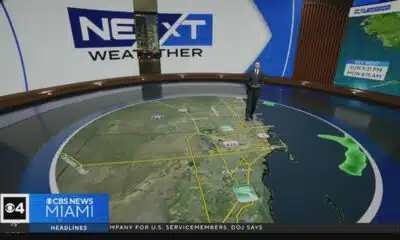News from the South - Virginia News Feed
Warner, Kaine condemn GOP tax bill over gun silencer rollback
Warner, Kaine condemn GOP tax bill over gun silencer rollback
by Markus Schmidt, Virginia Mercury
June 6, 2025
Virginia’s Democratic U.S. Sens. Mark Warner and Tim Kaine, D-Va., are slamming the Republican spending plan moving through Congress, warning that tucked among its billion-dollar tax cuts for the wealthy is a dangerous gift to the gun industry that rolls back long-standing safety rules for firearm silencers.
In a blistering joint statement Thursday, the senators said the proposal would weaken gun laws that have been in place since 1934 by eliminating registration and ownership requirements for silencers, also known as suppressors — devices that muffle the sound of gunfire and make it harder for law enforcement to respond to active shooter situations.
“The Republican tax plan being pushed through Congress not only cuts critical services Virginians rely on in order to give huge tax breaks to billionaires,” Warner and Kaine said, “but it also makes our communities less safe by weakening gun safety measures on silencers.”
Though the change occupies just 12 lines in the nearly 400-page bill, the senators say its implications are severe.
If passed, the bill would repeal the $200 tax on silencer purchases, wipe out federal registration requirements for the devices and deliver millions in savings to gun manufacturers. The suppressor tax, part of the National Firearms Act of 1934, has been a core part of federal gun law for nearly a century.
The two lawmakers pointed to the 2019 Virginia Beach mass shooting — where a gunman used a silencer to kill 12 people — as a grim example of what can happen when these devices are used.
“Part of the reason that these registration and ownership requirements exist is because silencers, like the one that was used in the Virginia Beach mass shooting, make it harder for law enforcement to locate and respond to an active shooter,” they said.
Silencers are designed to reduce the sound, flash and recoil of a firearm, but their public safety risks have made them a focal point of debate. Law enforcement groups have long supported keeping suppressors regulated, arguing that they undermine gunshot detection technology and make it far more difficult to locate shooters in an emergency.
According to the National Shooting Sports Foundation, 4.5 million suppressors were registered with the federal government by the end of 2024, including 113,046 in Virginia. The Joint Committee on Taxation estimates repealing the tax would cost the federal government $1.4 billion over ten years.
But for gun rights groups, even this deregulation isn’t enough.
The American Firearms Association called the move “nothing more than a crumb dropped from the King’s table,” and its Vice President Patrick Parsons said Republicans should go further by eliminating regulations on short-barrel rifles, abolishing the ATF and repealing the National Firearms Act altogether.
Warner and Kaine argue the silencer provision is just one piece of a broader bill they say would do massive harm to working families while lavishing the ultra-rich.
They warn that the legislation would strip health insurance from more than 262,000 Virginians, cut food assistance to over 204,000 people, raise energy costs across the state, and threaten more than 20,000 Virginia jobs.
They also noted the bill would eliminate a program that allows Americans to file taxes for free, raise taxes on minimum-wage workers, and blow a $3.8 trillion hole in the federal deficit — all while handing the top 0.1% of earners an average tax cut of $188,000.
“Americans deserve to feel safe in their communities,” the senators said, vowing to push back against “this disastrous bill” when it reaches the Senate floor.
YOU MAKE OUR WORK POSSIBLE.
Virginia Mercury is part of States Newsroom, a nonprofit news network supported by grants and a coalition of donors as a 501c(3) public charity. Virginia Mercury maintains editorial independence. Contact Editor Samantha Willis for questions: info@virginiamercury.com.
The post Warner, Kaine condemn GOP tax bill over gun silencer rollback appeared first on virginiamercury.com
Note: The following A.I. based commentary is not part of the original article, reproduced above, but is offered in the hopes that it will promote greater media literacy and critical thinking, by making any potential bias more visible to the reader –Staff Editor.
Political Bias Rating: Center-Left
This article predominantly presents the perspective of Democratic Senators Mark Warner and Tim Kaine, who criticize a Republican-led spending bill for benefiting the wealthy and weakening gun safety regulations. The framing highlights potential negative impacts on public safety and working families, emphasizing concerns over tax cuts for the ultra-rich and cuts to social programs. While it reports statements and positions factually, the language and focus clearly align with a progressive critique of conservative policy, reflecting a Center-Left bias. The article does not extensively present counterarguments or Republican viewpoints beyond brief mentions, which reinforces this leaning.
News from the South - Virginia News Feed
Some employers take action against employees for social media comments on Charlie Kirk's death
SUMMARY: Following Charlie Kirk’s death, some Virginia employers have taken action against employees who made controversial social media comments. In healthcare and education sectors, individuals were placed on leave or terminated for remarks deemed unprofessional or supportive of violence. Riverside Walter Reed Hospital fired an anesthesiologist, and Newport News and Accomack County schools disciplined staff members. Experts highlight the blurred line between personal expression and professional conduct due to social media’s reach. William and Mary law professor Margaret Hugh emphasized that employment laws and at-will policies allow employers broad authority to act. She urges unity and respect amid heightened tensions.
Some Virginia employers are taking action against employees for social media comments made regarding Charlie Kirk’s death. A legal expert weighed in on where the line is drawn.
Subscribe: https://www.youtube.com/user/wvectv/?sub_confirmation=1
Download the 13News Now app: https://bit.ly/13NewsNowApp
Watch 13News Now+ for free on streaming: https://www.13newsnow.com/13NewsNowPlus
Check out our website: https://www.13newsnow.com/
Like us on Facebook: https://www.facebook.com/13newsnow/
Follow us on X/Twitter: https://x.com/13newsnow
Follow us on Instagram: https://www.instagram.com/13newsnow/
News from the South - Virginia News Feed
Area of interest forms in the Atlantic
SUMMARY: On September 11, 2025, Chief Meteorologist Tim Pandages reported on Hurricane Hub Live about tropical developments in the Atlantic and eastern Pacific. In the Atlantic, a low-chance area of interest near the Cabo Verde Islands may become Tropical Storm Gabrielle but requires favorable conditions. Recent tropical waves have struggled due to stable atmospheric conditions. Models show possible development east of the Leeward Islands with a likely recurving path away from Bermuda. In the eastern Pacific, Tropical Depression 13E has formed, expected to become Hurricane Mario, the season’s 8th hurricane. The Atlantic has had only one hurricane so far, Major Hurricane Aaron. Activity is expected to increase into October.
The newly formed area of interest could become Invest 92-L off the coast of Africa. Find out about that and more during tonight’s episode of Hurricane Hub LIVE! Livestream from Thursday, September 11, 2025.
Subscribe: https://www.youtube.com/user/wvectv/?sub_confirmation=1
Download the 13News Now app: https://bit.ly/13NewsNowApp
Watch 13News Now+ for free on streaming: https://www.13newsnow.com/13NewsNowPlus
Check out our website: https://www.13newsnow.com/
Like us on Facebook: https://www.facebook.com/13newsnow/
Follow us on X/Twitter: https://x.com/13newsnow
Follow us on Instagram: https://www.instagram.com/13newsnow/
News from the South - Virginia News Feed
Cat cafes, chromotherapy and pumpkin delivery: Here’s what’s new in RVA this September
SUMMARY: This September in RVA, Patch to Porch RVA delivers handpicked pumpkins from local farms, offering design, setup, and cleanup services for homes and events in Richmond, Henrico, and Chesterfield. Shore Pump introduces Beam Light Sauna, featuring infrared sauna and chromotherapy, promoting detox, skin renewal, and wellness with customizable sessions and memberships. The Fan now hosts River City’s first cat café, The Perfect Bean, combining a coffee bar with an adoptable cat lounge upstairs. Sourced locally, their drinks include seasonal, cat-themed specials. Cats come from Purring Hearts VA rescue, offering adoption opportunities, fostering community engagement and animal welfare.
What’s New in RVA is dedicated to informing you about the latest happenings in the Richmond area.
-
News from the South - Virginia News Feed7 days ago
On the record: Winsome Earle-Sears
-
News from the South - Missouri News Feed6 days ago
1587 Prime gives first look at food, cocktail menu ahead of grand opening in KC
-
Mississippi News Video6 days ago
Interview: Come see Baptist at WTVA Senior Health Fair
-
News from the South - Arkansas News Feed6 days ago
‘One Pill Can Kill’ program aims to reduce opioid drug overdose
-
News from the South - West Virginia News Feed6 days ago
Protesters in D.C. flood the streets demanding an end to Trump’s military deployment
-
The Conversation6 days ago
How is paint made?
-
News from the South - Alabama News Feed6 days ago
Alabama lawmaker revives bill to allow chaplains in public schools
-
News from the South - Arkansas News Feed6 days ago
Arkansas’s morning headlines | Sept. 9, 2025








































